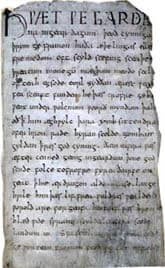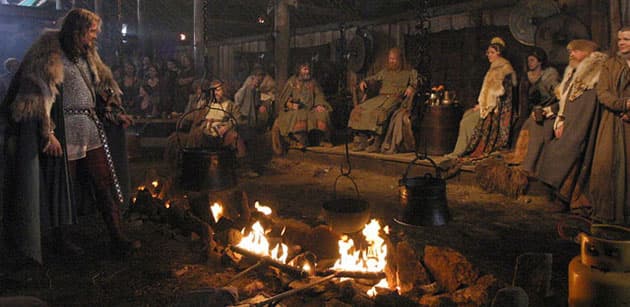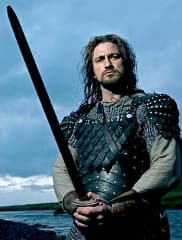Beowulf
Critique • Quotes • Text • Translations • At the movies
 Earliest known manuscript
Earliest known manuscriptFirst publication
c. 700
Literary form
Poem
Genres
Literary, epic, mythology, adventure
Writing language
Old English
Author's country
Unknown
Length
Approx. 30,000 words

Great hall inhabitants await their doom at the hands of a wronged troll in Beowulf & Grendel.
A monster tale to mull over
Beowulf & Grendel (2005): Film, 102 minutes; director Sturla Gunnarson; writer Andrew Rai Berzins; featuring Gerard Butler, Ingvar Eggert Sigurðsson, Stellan Skarsgård, Sarah Polley
Filmed in Iceland, Beowulf & Grendel (2005) is an international production involving Canada, Iceland and the United Kingdom. It is somewhat faithful to the story: Beowulf brings his team of warriors to the aid of Danish king Hrothgar to rid him of a monster who has been slaughtering his men.
But there's quite a back story filled in here too. The monster Grendel is called a troll in this film but seems really to be a primitive man, like a tall Neanderthal or perhaps even a Sasquatch. And he is killing apparently in revenge for the death of his own father some years earlier.
There's also a subplot about a witch who wins Beowulf's heart and turns out to have shared with Grendel as well.
Sounds far-fetched, but it mainly works. Grendel is humanized, which I suppose is why he shares the ampersanded title. He's sort of the misunderstood Frankenstein monster of his day, played beautifully and without a word of understandable dialogue by Icelandic actor Ingvar Sigurðsson.
Our hero gradually comes to recognize the monster isn't necessarily monstrous, which doesn't keep him from dispatching Grendel and going after his mother as well. She too is semi-human, not at all the sea serpent I pictured from the poem—more like a crazed mermaid.
Particularly admirable in this film is that Hrothgar and his so-called kingdom are so pathetic, nothing like the storybook king and castle you usually get in movies. He's really just a ragtag tribal chieftain, overseeing a bunch of near-savages eking out a living in a hostile environment and drunkenly brawling in their huts of sticks.
The film also has its clever moments. There's a whole other subplot about an early Christian missionary who comes to the Danes to convert them. One of the men reports, "Jesus Christ never sleeps...he walks amongst us," to which Beowulf replies, "That's all we need, a god gone mad from lack of sleep."
Beowulf is well personified by Gerard Butler (who was Dracula in Dracula 2000 but is better known as King Leonidas in 300). He's a manly hero for his time but also conflicted by his dawning realization that there is more to the story of Grendel than he was led to believe.
The Fish Beach scenes from Beowulf and Grendel (2005).
But this promising deconstruction of myth doesn't go far enough. It's just hinted at, and then the hero goes his not-so-merry and bloody way. We're left with a feeling that we don't really know what this film was trying to do. That thematic confusion, coupled with the difficulties of following some of the dialogue (the combination of Scottish and Scandinavian accents!), leaves us lost much of the time. I wouldn't be surprised to learn the film was drastically edited for release—we seem to be missing basic points.
But Beowulf & Grendel is the best adaptation of the story yet, and an intriguing one at that. You're liable to find yourself mulling it over weeks after viewing it.
— Eric
Critique • Quotes • Text • Translations • At the movies


